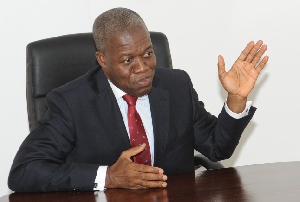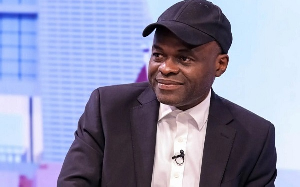Vice president Kwesi Amissah-Arthur has challenged security experts to come out with strategies that could offer state security forces the required advantage to deal with emerging threats.
He said the menace from non-state actors such as terrorists and insurgents have made it essential for states to share experiences so that they could identify the right policies and systems to tackle the problem.
Vice president Amissah-Arthur made the call when he opened the 2015 Command, Control, Communication, Computer, Intelligence, Surveillance, Reconnaissance (C4ISR) and African Homeland Security Conference and Exhibition in Accra.
The two-day conference, which is being attended by security professionals from Greece, South Africa , Nigeria, Togo among others would discuss topics such as delivering C4ISR capabilities to troops participating in Peace Support Operations, establishing a maritime security system in West Africa and fighting terrorism, especially learning the proper lessons from operations against Boko Haram.
It is also expected that participants at the conference would offer great insight into senior-level decision-making, especially the networking and information-sharing opportunities for the benefit of everybody.
Vice president Amissah-Arthur stated that traditionally military structures have been very hierarchical however the basis for this chain of command have been undermined by modern innovations in computer and communications that have made redundant the monopoly of information and their strict categorisation and sharing.
He said an emerging emphasis on operations other than war may require more flexible non-traditional organisational structures such that the volume of information generated could be processed and disseminated to enhance command and control.
He said increasingly the country’s military forces are involved in operations other than war such as peacekeeping, counter-terrorism and humanitarian relief, search and rescue operations and in flood and disaster control.
Chief of Army Staff, Major General Richard Opoku-Adusei, stated that the country is happy to be associated with the conference because it seeks collaborate defence and homeland security professionals to integrate intelligence, surveillance and reconnaissance capabilities to achieve control over a spectrum of defence, terrorists threats and transnational crime.
He said in recent times security challenges such as drug trafficking, organized crime, human trafficking and terrorism among others demands new approach to security operations, adding that the information technology sector is a critical partner in confronting these challenges.
Maj. Gen Opoku-Adusei also stated that the issue of homeland security has become a major concern because of globalisation and advance in technology have driven unprecedented increases in innovation, competitiveness and economic growth around the world.
He said the digital economy is booming, creating new jobs and opportunities the nation could not have imagined a decade ago.
He said the economic platforms of the future are increasingly online adding that with this new digital economy, comes new threats.
Maj. Gen. Opoku-Adusei stated that the national and economic security of the country depends on the reliable functioning of critical infrastructure, like internet, roads, power grids and water supply systems.
He said interestingly, “our adversaries equally employ ICT to disable the platforms provided for national economic survival”.
He therefore called on the participants attending the conference to examine policies that could define the framework for C4ISR architecture that militaries could adopt to enhance interoperability and efficient utilisation of systems.
General News of Thursday, 27 August 2015
Source: GNA













